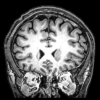Well the dopamine hypothesis is just that, a hypothesis. There is alot of research into other areas which may attribute to schizophrenia also, such as glutamatergic transmission, kynurenic acid, inflammatory abnormalities etc. I believe the main evidence for it (dopamine) being that antipsychotics (which antagonize dopamine receptors) reduce symptoms. The first antipsychotic was actually discovered by accident. If I remember correctly it was being used as an anesthetic when by chance they discovered it reduced symptoms of schizophrenia, which is what led to the discovery that antagonizing dopamine receptors reduces psychotic symptoms. There is also the evidence of stimulant psychosis too.
When I was reading up on negative symptoms, I found there was some evidence to suggest that hyperactive dopaminergic signalling in the mesolimibic pathway contributes to positive symptoms, where as a lack of dopamine function in the mesocortical pathway contributed to negative symptoms. This would suggest that some areas of the brain would benefit from increased dopamine, where as other areas would be sensitized to it.
I don't have a thorough knowledge of neuroscience. But based on my own experience and research, I'll take a guess. Don't take my word for it though.
Antipsychotics typically block D2 receptors, I think research has even shown the occupancy an AP has at D2 will predict it's effectiveness. Blocking D2 can, perhaps, allow dopamine to be shifted moreso to the other receptors, such as D1, D4. These receptors are involved in modulating the prefontal cortex (where there is a hypothesised deficiency), but what is also of interest is that D1 agonism has been shown to be linked to glutamate transmission. In other words stimulating D1 may be responsible for enhancing glutamate function.
The interesting thing about antipsychotic treatment is that dopamine levels are modified upon ingestion, whereas a reduction in symtpoms can take weeks/months. Suggesting dopamine may be indirectly responsible for symptoms.
Personally I have tried a bunch of dopaminergic drugs, such as ritalin, amphetamine, and in rather high doses too, and never experienced psychotic symptoms!
I took phenylpiracetam once and boom was smack bang in the middle of a psychotic break (keep in mind I have always had insight).
To add to that, I went on risperidone last year and within a few months I was completely symptoms free. Really a dramatic improvement and change, evidence to me that dopamine antagonism is obviously effective. I've been off risperidone for around 3+ months now and am still doing really well, basically 95% symptom free.
So my only guess, and it is a guess, and it is based on my own experience. I believe I can tolerate dopamine release in certain areas of the brain, such as prefrontal cortex, D1, D4 receptors etc. But in certain other areas I cannot (interestingly phenyl is believed to upregulate D2).
All in all schizophrenia is just a really complex brain disorder. From what I can tell not all that much is really known about it, and there are so many variables with these kind of things. Hope this post gives you some insight anyway 
Edited by mono, 19 June 2014 - 05:12 AM.
















































